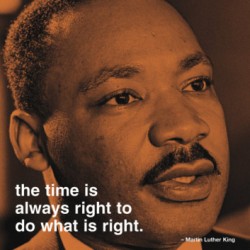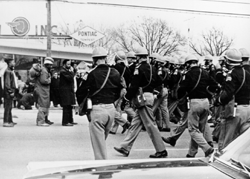Daily Archives: 03/25/2024
1967 – Martin Luther King leads march against the war – Vietnam War 1967
 The Reverend Martin Luther King, Jr., leads a march of 5,000 antiwar demonstrators in Chicago. In an address to the demonstrators, King declared that the Vietnam War was “a blasphemy against all that America stands for.” King first began speaking out against American involvement in Vietnam in the summer of 1965. In addition to his moral objections to the war, he argued that the war diverted money and attention from domestic programs to aid the black poor. He was strongly criticized by other prominent civil rights leaders for attempting to link civil rights and the antiwar movement.
The Reverend Martin Luther King, Jr., leads a march of 5,000 antiwar demonstrators in Chicago. In an address to the demonstrators, King declared that the Vietnam War was “a blasphemy against all that America stands for.” King first began speaking out against American involvement in Vietnam in the summer of 1965. In addition to his moral objections to the war, he argued that the war diverted money and attention from domestic programs to aid the black poor. He was strongly criticized by other prominent civil rights leaders for attempting to link civil rights and the antiwar movement.
The Triangle Shirtwaist Factory Fire (March 25, 1911)
MLK led thousands of peaceful Americans on a 5day march to Selma- On 3/25/1965

The march, which King described as “a shining moment in the conscience of man,” was the culmination of a three-month campaign to eliminate African American disenfranchisement in Alabama.
On March 25 1965, Martin Luther King led thousands of nonviolent demonstrators to the steps of the capitol in Montgomery, Alabama, after a 5-day, 54-mile march from Selma, Alabama, where local African Americans, the Student Nonviolent Coordinating Committee (SNCC) and the Southern Christian Leadership Conference (SCLC) had been campaigning for voting rights. King told the assembled crowd: ‘‘There never was a moment in American history more honorable and more inspiring than the pilgrimage of clergymen and laymen of every race and faith pouring into Selma to face danger at the side of its embattled Negroes’’ (King, ‘‘Address at the Conclusion of the Selma to Montgomery March,’’ 121).
On 2 January 1965 King and SCLC joined the SNCC, the Dallas County Voters League, and other local African American activists in a voting rights campaign in Selma where, in spite of repeated registration attempts by local blacks, only two percent were on the voting rolls. SCLC had chosen to focus its efforts in Selma because they anticipated that the notorious brutality of local law enforcement under Sheriff Jim Clark would attract national attention and pressure President Lyndon B. Johnson and Congress to enact new national voting rights legislation.
The campaign in Selma and nearby Marion, Alabama, progressed with mass arrests but little violence for the first month. That changed in February, however, when police attacks against nonviolent demonstrators increased. On the night of 18 February, Alabama state troopers joined local police breaking up an evening march in Marion. In the ensuing melee, a state trooper shot Jimmie Lee Jackson, a 26-year-old church deacon from Marion, as he attempted to protect his mother from the trooper’s nightstick. Jackson died eight days later in a Selma hospital.
In response to Jackson’s death, activists in Selma and Marion set out on 7 March, to march from Selma to the state capitol in Montgomery. While King was in Atlanta, his SCLC colleague Hosea Williams, and SNCC leader John Lewis led the march. The marchers made their way through Selma across the Edmund Pettus Bridge, where they faced a blockade of state troopers and local lawmen commanded by Clark and Major John Cloud who ordered the marchers to disperse. When they did not, Cloud ordered his men to advance. Cheered on by white onlookers, the troopers attacked the crowd with clubs and tear gas. Mounted police chased retreating marchers and continued to beat them.
Television coverage of ‘‘Bloody Sunday,’’ as the event became known, triggered national outrage. Lewis, who was severely beaten on the head, said: ‘‘I don’t see how President Johnson can send troops to Vietnam—I don’t see how he can send troops to the Congo—I don’t see how he can send troops to Africa and can’t send troops to Selma,’’ (Reed, ‘‘Alabama Police Use Gas’’).
That evening King began a blitz of telegrams and public statements, ‘‘calling on religious leaders from all over the nation to join us on Tuesday in our peaceful, nonviolent march for freedom’’ (King, 7 March 1965). While King and Selma activists made plans to retry the march again two days later, Federal District Court Judge Frank M. Johnson, Jr. notified the movement attorney Fred Gray that he intended to issue a restraining order prohibiting the march until at least 11 March, and President Johnson pressured King to call off the march until the federal court order could provide protection to the marchers.
Forced to consider whether to disobey the pending court order, after consulting late into the night and early morning with other civil rights leaders and John Doar, the deputy chief of the Justice Department’s Civil Rights Division, King proceeded to the Edmund Pettus Bridge on the afternoon of 9 March. He led more than 2,000 marchers, including hundreds of clergy who had answered King’s call on short notice, to the site of Sunday’s attack, then stopped and asked them to kneel and pray. After prayers they rose and turned the march back to Selma, avoiding another confrontation with state troopers and skirting the issue of whether to obey Judge Johnson’s court order. Many marchers were critical of King’s unexpected decision not to push on to Montgomery, but the restraint gained support from President Johnson, who issued a public statement: ‘‘Americans everywhere join in deploring the brutality with which a number of Negro citizens of Alabama were treated when they sought to dramatize their deep and sincere interest in attaining the precious right to vote’’ (Johnson, ‘‘Statement by the President,’’ 272). Johnson promised to introduce a voting rights bill to Congress within a few days.
That evening, several local whites attacked James Reeb, a white Unitarian minister who had come from Massachusetts to join the protest. His death two days later contributed to the rising national concern over the situation in Alabama. Johnson personally telephoned his condolences to Reeb’s widow and met with Alabama Governor George Wallace, pressuring him to protect marchers and support universal suffrage.
On 15 March Johnson addressed the Congress, identifying himself with the demonstrators in Selma in a televised address: ‘‘Their cause must be our cause too. Because it is not just Negroes, but really it is all of us, who must overcome the crippling legacy of bigotry and injustice. And we shall overcome’’ (Johnson, ‘‘Special Message’’). The following day Selma demonstrators submitted a detailed march plan to federal Judge Frank M. Johnson, Jr., who approved the demonstration and enjoined Governor Wallace and local law enforcement from harassing or threatening marchers. On 17 March President Johnson submitted voting rights legislation to Congress.
The federally sanctioned march left Selma on 21 March. Protected by hundreds of federalized Alabama National Guardsmen and Federal Bureau of Investigation agents, the demonstrators covered between 7 to 17 miles per day. Camping at night in supporters’ yards, they were entertained by celebrities such as Harry Belafonte and Lena Horne. Limited by Judge Johnson’s order to 300 marchers over a stretch of two-lane highway, the number of demonstrators swelled on the last day to 25,000, accompanied by Assistant Attorneys General John Doar and Ramsey Clark, and former Assistant Attorney General Burke Marshall, among others.
During the final rally, held on the steps of the capitol in Montgomery, King proclaimed: ‘‘The end we seek is a society at peace with itself, a society that can live with its conscience. And that will be a day not of the white man, not of the black man. That will be the day of man as man’’ (King, ‘‘Address,’’ 130). Afterward a delegation of march leaders attempted to deliver a petition to Governor Wallace, but were rebuffed. That night, while ferrying Selma demonstrators back home from Montgomery, Viola Liuzzo, a housewife from Michigan who had come to Alabama to volunteer, was shot and killed by four members of the Ku Klux Klan. Doar later prosecuted three Klansmen conspiring to violate her civil rights.
On 6 August, in the presence of King and other civil rights leaders, President Johnson signed the Voting Rights Act of 1965. Recalling ‘‘the outrage of Selma,’’ Johnson
called the right to vote ‘‘the most powerful instrument ever devised by man for breaking down injustice and destroying the terrible walls which imprison men because they are different from other men’’ (Johnson, ‘‘Remarks’’). In his annual address to SCLC a few days later, King noted that ‘‘Montgomery led to the Civil Rights Act of 1957 and 1960; Birmingham inspired the Civil Rights Act of 1964, and Selma produced the voting rights legislation of 1965’’ (King, 11 August 1965).
SOURCES
Garrow, Protest at Selma, 1978.
Johnson, ‘‘Remarks in the Capitol Rotunda at the Signing of the Voting Rights Act,’’ 6 August 1966, in Public Papers of the Presidents: Lyndon B. Johnson, 1965, bk.2, 1966.
Johnson, ‘‘Special Remarks to the Congress: The American Promise,’’ 15 March 1965, in Public Papers of the Presidents: Lyndon B. Johnson, bk. 1, 1966.
Johnson, ‘‘Statement by the President on the Situation in Selma, Alabama,’’ 9 March 1965, in Public Papers of the Presidents: Lyndon B. Johnson, 1965, bk. 1, 1966.
King, ‘‘Address at Conclusion of the Selma to Montgomery March,’’ in A Call to Conscience, Carson and Shepard, eds., 2001.
King, Annual report at SCLC convention, 11 August 1965, MLKJP-GAMK.
King, Statement on violence committed by state troopers in Selma, Alabama, 7 March 1965, MLKJP-GAMK.
King to Elder G. Hawkins, 8 March 1965, NCCP-PPPrHi.
Lewis, Walking with the Wind, 1998.
Roy Reed, ‘‘Alabama Police Use Gas and Clubs to Rout Negroes,’’ New York Times, 8 March 1965.
kingencyclopediastanford.edu
on this day … 3/25 1965 – Martin Luther King Jr. led a group of 25,000 to the state capital in Montgomery, AL.
 0421 – The city of Venice was founded.
0421 – The city of Venice was founded.
1306 – Robert the Bruce was crowned king of Scotland.
1409 – The Council of Pisa opened.
1609 – Henry Hudson left on an exploration for Dutch East India Co.
1634 – Lord Baltimore founded the Catholic colony of Maryland.
1655 – Puritans jailed Governor Stone after a military victory over Catholic forces in the colony of Maryland.
1655 – Christian Huygens discovered Titan. Titan is Saturn’s largest satellite.
1669 – Mount Etna in Sicily erupted destroying Nicolosi. 20,000 people were killed.
1700 – England, France and Netherlands ratify the 2nd Extermination Treaty.
1753 – Voltaire left the court of Frederik II of Prussia.
1774 – English Parliament passed the Boston Port Bill.
1776 – The Continental Congress authorized a medal for General George Washington.
1802 – France, Netherlands, Spain and England signed the Peace of Amiens.
1807 – The first railway passenger service began in England.
1807 – British Parliament abolished the slave trade.
1813 – The frigate USS Essex flew the first U.S. flag in battle in the Pacific.
1814 – The Netherlands Bank was established.
1820 – Greece freedom revolt against anti Ottoman attack
1821 – Greece gained independence from Turkey.
1856 – A. E. Burnside patented Burnside carbine.
1857 – Frederick Laggenheim took the first photo of a solar eclipse.
1865 – The SS General Lyon at Cape Hatteras caught fire and sank. 400 people were killed.
1865 – During the American Civil War, Confederate forces captured Fort Stedman in Virginia.
1879 – Japan invaded the kingdom of Liuqiu (Ryukyu) Islands, formerly a vassal of China.
1895 – Italian troops invaded Abyssinia (Ethiopia).
1898 – The Intercollegiate Trapshooting Association was formed in New York City.
1900 – The U.S. Socialist Party was formed in Indianapolis.
1901 – 55 people died when a Rock Island train derailed near Marshalltown, IA.
1901 – The Mercedes was introduced by Daimler at the five-day “Week of Nice” in Nice, France.
1901 – It was reported in Washington, DC, that Cubans were beginning to fear annexation.
1902 – Irving W. Colburn patented the sheet glass drawing machine.
1902 – In Russia, 567 students were found guilty of “political disaffection.” 95 students were exiled to Siberia.
1904 – E.D. Morel and Roger Casement formed the Congo Reform Association in Liverpool.
1905 – Rebel battle flags that were captured during the American Civil War were returned to the South.
1905 – Russia received Japan’s terms for peace.
1907 – Nicaraguan troops took Tegucigalpa, the capital of Honduras.
1908 – Wilhelm II paid an official visit to Italy’s king in Venice.
1909 – In Russia, revolutionary Popova was arrested on 300 murder charges.
1911 – In New York City, 146 women were killed in fire at the Triangle Shirtwaist Company in New York City. The owners of the company were indicted on manslaughter charges because some of the employees had been behind locked doors in the factory. The owners were later acquitted, and in 1914 they were ordered to pay damages to each of the twenty-three families that had sued.
1913 – The Palace Theatre opened in New York City.
1915 – 21 people died when a U.S. F-4 submarine sank off the Hawaiian coast.
1919 – The Paris Peace Commission adopted a plan to protect nations from the influx of foreign labor.
1923 – The British government granted Trans-Jordan autonomy.
1931 – Fifty people were killed in riots that broke out in India. Gandhi was one of many people assaulted.
1931 – The Scottsboro Boys were arrested in Alabama.
1936 – The Detroit Red Wings defeated the Montreal Maroons in the longest hockey game to date. The game lasted for 2 hours and 56 minutes.
1940 – The U.S. agreed to give Britain and France access to all American warplanes.
1941 – Yugoslavia joined the Axis powers.
1941 – The first paprika mill was incorporated in Dollon, SC.
1947 – A coalmine explosion in Centralia, IL, killed 111 people.
1947 – John D. Rockefeller III presented a check for $8.5 million to the United Nations for the purchase of land for the site of the U.N. center.
1953 – The USS Missouri fired on targets at Kojo, North Korea.
1954 – RCA manufactured its first color TV set and began mass production.
1957 – The European Economic Community was established with the signing of the Treaty of Rome.
1960 – A guided missile was launched from a nuclear powered submarine for the first time.
1965 – Martin Luther King Jr. led a group of 25,000 to the state capital in Montgomery, AL.
1966 – The U.S. Supreme Court ruled that the “poll tax” was unconstitutional.
1970 – The Concorde made its first supersonic flight.
1971 – The Boston Patriots became the New England Patriots.
1972 – Bobby Hull joined Gordie Howe to become only the second National Hockey League player to score 600 career goals.
1975 – King Faisal of Saudi Arabia was shot to death by a nephew. The nephew, with a history of mental illness, was beheaded the following June.
1981 – The U.S. Embassy in San Salvador was damaged when gunmen attacked using rocket propelled grenades and machine guns.
1981 – The Down Jones industrial avarage of selected stocks on the New York Stock Exchanged closed at its highest level in more than eight years.
1982 – Wayne Gretzky became the first player in the NHL to score 200 points in a season.
1983 – The U.S. Congress passed legislation to rescue the U.S. social security system from bankruptcy.
1985 – It was reported that a U.S. Army Major stationed in East Germany had been shot and killed by a Soviet Border Guard.
1986 – U.S. President Ronald Reagan ordered emergency aid for the Honduran army. U.S. helicopters took Honduran troops to the Nicaraguan border.
1988 – Robert E. Chambers Jr. pled guilty to first-degree manslaughter in the death of 18-year-old Jennifer Levin. The case was known as New York City’s “preppie murder case.”
1989 – In Paris, the Louvre reopened with I.M. Pei’s new courtyard pyramid.
1990 – A fire in Happy Land, an illegal New York City social club, killed 87 people.
1990 – Estonia voted for independence from the Soviet Union.
1991 – Iraqi President Saddam Hussein launched a major counter-offensive to recapture key towns from Kurds in northern Iraq.
1992 – Soviet cosmonaut Sergei Krikalev returned to Earth after spending 10 months aboard the orbiting Mir space station.
1993 – President de Klerk admitted that South Africa had built six nuclear bombs, but said that they had since been dismantled.
1994 – United States troops completed their withdrawal from Somalia.
1995 – Boxer Mike Tyson was released from jail after serving 3 years.
1996 – An 81-day standoff by the antigovernment Freemen began at a ranch near Jordan, MT.
1996 – The U.S. issued a newly redesigned $100 bill for circulation.
1998 – A cancer patient was the first known to die under Oregon‘s doctor-assisted suicide law.
1998 – The FCC nets $578.6 million at auction for licenses for new wireless technology.
1998 – Quinn Pletcher was found guilty on charges of extortion. He had threatened to kill Bill Gates unless he was paid $5 million.
2002 – The Federal Communications Commission (FCC) dismissed complaints against Walt Disney Co.’s ABC network broadcast of a Victoria’s Secret fashion show in November 2001.
2004 – The U.S. Senate voted (61-38) on the Unborn Victims of Violence Act (H.R. 1997) to make it a separate crime to harm a fetus during the commission of a violent federal crime.



You must be logged in to post a comment.